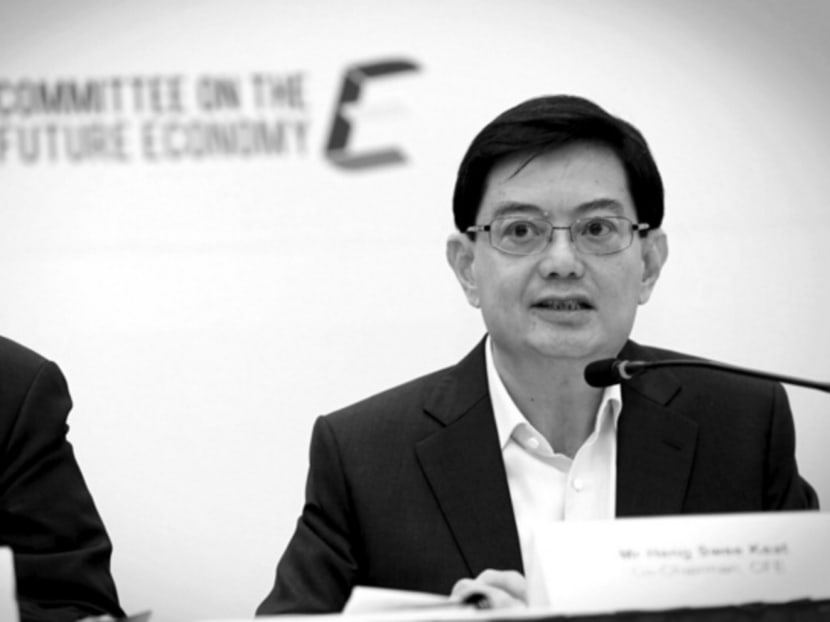Grooming S’poreans to be global citizens who can thrive anywhere
At the start of his Budget speech, Finance Minister Heng Swee Keat warned that an “inward- looking mood” had taken root in several countries, echoing what the Committee on the Future Economy (CFE) report called a “dark shift” away from globalisation.

Finance Minister Heng Swee Keat at the launch of the Committee on the Future Economy report on Feb 9.
He warned in his Budget speech that an ‘inward-looking mood’ had taken root in several countries. TODAY file photo
At the start of his Budget speech, Finance Minister Heng Swee Keat warned that an “inward- looking mood” had taken root in several countries, echoing what the Committee on the Future Economy (CFE) report called a “dark shift” away from globalisation.
Despite this, many of the Budget 2017 measures aim to make Singapore firms and workers even more globally-oriented. Can an outward-looking strategy still work in a world where major economies are turning protectionist?
Singapore has responded to the anti-globalisation sentiment by championing internationalisation even more strongly. This renewed commitment to globalisation should not come as a surprise. As an island city-state, Singapore has no choice but to rely on its connections to other countries. But Budget 2017 and the CFE’s recommendations also explicitly look beyond the current economic headwinds. Calls for firms to “go international, go digital and to innovate” are not merely responses to boost short-term competitiveness, but steps to establish longer-term relevance for Singapore.
The question then is, how will Singaporeans and companies here respond to such calls?
There is a great deal of uncertainty among Singaporeans about the future of the world economy and what this means for the business environment and job market in Singapore. The Budget and CFE report acknowledge these concerns. Yet, at the same time, it is important to avoid unnecessary pessimism and cynicism.
Despite surprise developments last year such as Brexit and Mr Donald Trump’s electoral victory, the global economy has not been catastrophically affected. Some economists even argue there are signs that we are entering a cyclical upturn, with some positive trends in trade volume. The good news has merely been eclipsed by the ongoing political turmoil in key advanced economies and fears about the implications for the rest of the world.
If American and European markets are indeed becoming less receptive to free trade and investment liberalisation, links between Singapore and its Asian neighbours will matter more than ever before.
Budget 2017 contains a range of measures to give Singapore’s students and professionals more international exposure and knowledge of other markets, collectively referred to as the Global Innovation Alliance. In announcing the measures, Mr Heng listed San Francisco as an initial target city for these international outreach efforts. But all the other locations he mentioned were Asian, including Beijing and cities in the Association of South-east Asian Nations (Asean).
The CFE report paints a picture of a future where Singaporeans may need to spend more time living and working overseas. To some degree, Singaporeans are already globally-minded, with many people being both well travelled and well informed. But what the CFE envisions is a cohort of citizens who have a deeper understanding about other countries, particularly Singapore’s neighbours in the near abroad. Such global citizens would go beyond knowing the best shopping and dining spots in Bangkok; they would also intimately grasp the myriad intricacies of doing business in Jakarta, Manila and Yangon.
Workers can no longer count on staying for years in the same location, the same job or even the same industry. Beyond internationalism, Budget 2017 also contains measures aimed at supporting people who are moving between different sectors. It is not just lower-skilled workers who need to upgrade and adapt. Even highly-paid and highly-trained professionals cannot count on having complete job security. Economic shifts and technological disruptions mean there are no longer any proverbial iron rice bowls.
A key takeaway from the CFE exercise and ongoing national efforts like the SkillsFuture movement is that Singapore’s people must be willing to move beyond their old and familiar comfort zones. Many people around the world are now driven by fear of foreign competition, seeking to keep others out. But Singapore cannot afford to encourage such insular attitudes.
Instead, Singapore needs to foster an adventurous spirit, a collectively-held willingness to embrace the world and seek out new opportunities. Agility and adaptiveness are required if Singapore is to succeed in a rapidly changing world.
The challenge now is how to groom and develop a cohort of young Singaporeans who embrace the imperative of being global citizens, and who can operate anywhere in the world to further commercial as well as national interests. This cultural and mindset change typically requires an inter-generational transition. But with the world changing at an ever-increasing pace, we may not have the luxury of decades to achieve this shift, and risk being left behind if we cannot adapt quickly enough.
Education and financial incentives are the levers available to the Government to usher in such changes. But for such a shift to be truly successful, Singaporeans need to understand the challenges we face, and accept the need for us to change and adapt if we are to remain relevant and successful in the years ahead.
ABOUT THE AUTHORS: Nicholas Fang and Aaron Choo are, respectively, executive director and assistant director at the Singapore Institute of International Affairs (SIIA). The SIIA is holding a dialogue on March 13 on “Technology and the Future of Jobs”, part of the institute’s Global Citizens Singapore (GCS) programme exploring the human and social dimensions of emerging international trends.






